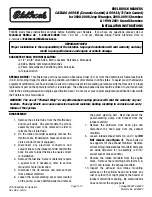
Engine compartment
159
The brake fluid level is correct when it is
between lower mark (MIN)
2
and upper
mark (MAX)
1
of the brake fluid reservoir.
The engine coolant is a mixture of water and
anticorrosion/antifreeze.
When checking the coolant level, the vehicle
must be parked on level ground, and the
coolant temperature must be below 158‡
(70
†
).
In order to avoid any potentially serious
burns:
R
Use extreme caution when opening the
hood if there are any signs of steam or
coolant leaking from the cooling system,
or if the coolant temperature gauge
indicates that the coolant is overheated.
R
Do not remove pressure cap on coolant
reservoir if coolant temperature is above
158‡ (70†). Allow engine to cool down
before removing cap. The coolant
reservoir contains hot fluid and is under
pressure.
R
Using a rag, slowly open the cap
approximately
1
/
2
turn to relieve excess
pressure. If opened immediately,
scalding hot fluid and steam will be blown
out under pressure.
R
Do not spill antifreeze on hot engine
parts. Antifreeze contains ethylene
glycol which may burn if it comes into
contact with hot engine parts.
1
Coolant expansion tank
X
Using a rag, turn the cap slowly
approximately
1
/
2
turn counterclockwise
to release any excess pressure.
X
Continue turning the cap counterclockwise
and remove it.
The coolant level is correct if the level
R
for cold coolant: is up to the upper mark
on the bracing rib of coolant expansion
tank
1
(translucent)
R
for warm coolant: is approximately 0.6 in
(1.5 cm) higher
X
Add coolant as required.
X
Attach and tighten cap.
!
Only open the cap on the coolant
expansion tank. Never open the cap
between the two charge-air coolers.
Otherwise, the engine could be damaged.
For more information on coolant, see the
“Technical data” section (
Operation
230_AKB; 1; 42, en-US
d2ureepe,
Version: 2.11.7.1
2008-11-27T15:37:19+01:00 - Seite 159
Z
















































